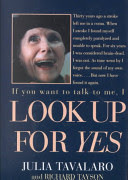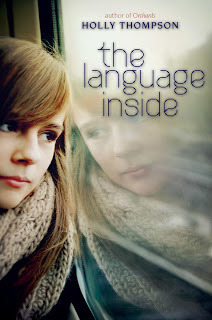The Language Inside and Inspiration from Poet Julia Tavalaro
When I was a graduate student in the NYU Creative Writing Program in the 1980s, the Goldwater writing workshops at Goldwater Memorial Hospital on Roosevelt Island had recently been launched by poet Sharon Olds, and I signed up as a volunteer in the program. I was terrified. At NYU I was studying as a fiction writer; I was a timid closet poet. I was also squeamish in hospitals and had no experience whatsoever working with the chronically ill or severely disabled.
At Goldwater Hospital, I was first assigned to assist two patients in writing--one a gunshot wound victim writing an autobiographical novel, and another, poet Julia Tavalaro. Julia had had a brain-stem stroke some twenty years prior in 1966 at the age of 32 and had been subsequently paralyzed and locked in. Unable to speak, she’d been assumed to be unresponsive for six years despite efforts by her sister to convince doctors that she was cognizant. A speech therapist finally took the initiative to ask Julia several key questions to which Julia was able to blink in response. From then on, Julia was able to communicate by looking up to indicate yes, and eventually, through very slight head movement, to operate a wheelchair and write with a computer.
With Julia, I used a letter board as instructed, pointing to the columns of letters one by one then running down the letters until she looked up, then writing down the selected letter—this was how she communicated her poems, letter by letter. But I was shy and intimidated, and Julia controlled our conversations. She was bossy and could be mean—once when I called an aide in to help me, Julia spelled the word “stupid.” I know she meant me. I admit I was not very effective working with Julia.
Ultimately I was reassigned to a different patient with a mellower temperament. I felt somewhat defeated but knew that another volunteer and a more accomplished poet might be better suited to working with Julia. I did start speaking up to comment on Julia’s poems in the group workshops, and over time I became bolder at communicating with her when I saw her.
Some years later, through the assistance of poet Richard Tayson, Julia wrote her memoir, Look Up for Yes (Kodansha International, 1997). She was even able to move out of Goldwater Hospital. She lived on with her fierce spirit, writing poems and looking up for yes, until 2003.

Anyone who worked with Julia was profoundly affected by her. She had a fiery determination. She was stubborn. Angry. Crass. Funny. Defiant. Devious. She was unforgettable, and I knew that one day I’d write a story about a girl who works with a brainstem stroke victim. It took me years to finally tackle the story and to take inspiration and courage from Julia to create the character of Zena in my verse novel The Language Inside, in which Emma, a high school student raised in Japan, finds herself volunteering at a long-term care center in Massachusetts assisting Zena in writing her poems.
In writing The Language Inside, I knew that the poems Zena and Emma created, as well as the letter board conversations, would be central to the story. In addition to writing the entire novel in verse, I had to write poems in Zena’s voice, in Emma’s voice, and in the voice of Samnang, the Cambodian-American volunteer assisting Cambodian elders in the long-term care center. The poems they discussed in their writing sessions would also be important to the story. The novel became infused with poetry. Poetry impacted the action of the characters and the action fed the poems the characters wrote.

Now, some 25 years after I first met Julia Tavalaro, my novel The Language Inside (Delacorte/Random House, May 2013) has just published. Now that I am older and not quite so “stupid” (I hope), how I wish I could share the news with Julia. I know she’d have something wry to spell out to me—probably along the lines of “What took you so long?”
Thank you, Sharon Olds, for leading the unforgettable workshops at Goldwater Hospital.
And thank you, Julia Tavalaro, for showing me what perseverance really means.
The below excerpt is from “Poem in Mind” by Julia Tavalaro (printed in Look Up for Yes by Julia Tavalaro and Richard Tayson)
Poem in Mind
Take this poem homeRead it no feed it to the mindThe mind fabulously famishedThe mind oh so hungry
**********
Published on May 16, 2013 04:00
No comments have been added yet.



